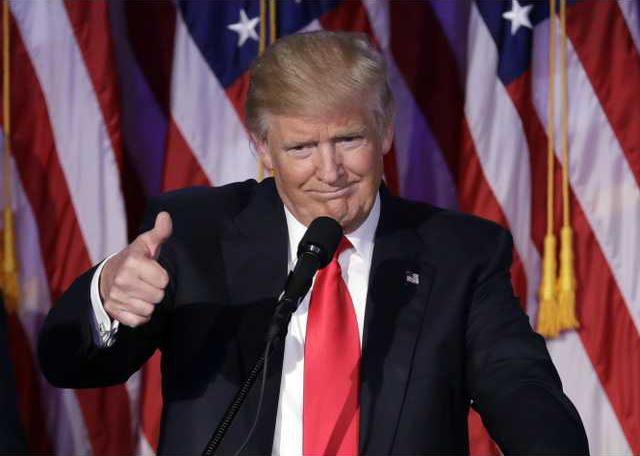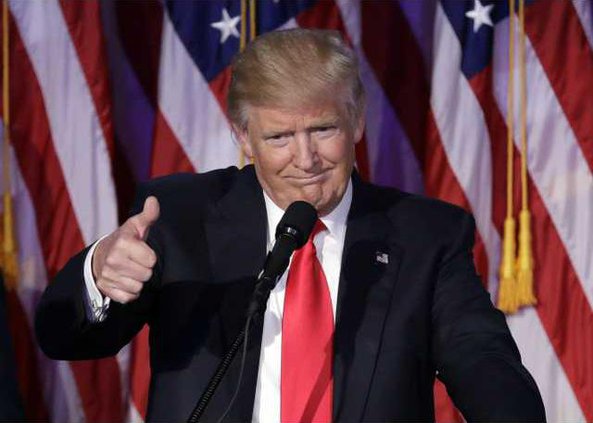WASHINGTON — Donald Trump shocked the political establishment Tuesday, triumphing over not just Hillary Clinton but large parts of his own party’s hierarchy to be projected the winner of the presidency in one of the biggest upsets in U.S. political history.
Speaking to cheering supporters at a midtown victory celebration, Trump said Clinton had phoned to congratulate him on his victory. He said he congratulated her on a hard-fought campaign.
“It’s time for America to bind the wounds of division,” he said. “I say it is time for us to come together as a united country.”
Earlier, Clinton held off on conceding. Her campaign manager, John Podesta told a dispirited crowd at the Javits Center in New York, that the former secretary of State would wait until at least the morning to assess her chances.
“It’s been a long night, and it’s been a long campaign, but we can wait a little longer, can’t we?” he said. “They’re still counting votes, and every vote should count. Several states are too close to call, so we’re not going to have anything more to say tonight,” Podesta said.
But Clinton was clearly fighting uphill. Trump’s apparent victory, which defied most pre-election polls and the opinions of the nation’s foreign policy, financial and cultural elites, resulted from a massive outpouring of votes in rural areas and small towns across the country, overturning Democratic calculations that their dominance of urban America would seal their victory.
With Republicans also beating the odds in close Senate races, the party stood on the verge of having a united government in their hands once again for the first time in a decade.
Amid unusually high turnout in several keenly contested states, Clinton received strong support from minority voters, especially Latinos, and did much better among college-educated white voters than any previous Democratic nominee.
In several states, including such battlegrounds as Florida and Nevada, an outpouring of early voting by Democrats broke records and prompted Clinton strategists to prematurely predict victory.
Trump countered on Election Day, piling up huge majorities among the non-college-educated, blue-collar whites who have long been the mainstay of his support.
Clinton’s backing lagged behind the levels achieved by President Barack Obama four years ago in several key areas.
In some major cities, African-American voters did not turn out as heavily for her as they had for Obama. The deficits were even more pronounced in blue-collar white regions such as northeastern Pennsylvania. There Clinton’s weakness offset her strength in the state’s suburbs, leading to an excruciatingly close race that seesawed through the evening.
But the central story of the night was not Clinton’s weakness so much as Trump’s strength and the ardent support he inspired among voters who stood with him despite a campaign full of tribulations, many self-inflicted.
While Clinton won Virginia, Colorado and Nevada, states that Democrats pointed to as examples of the growing racial and ethnic diversity that would cement their majority, Trump’s appeal to an older, less cosmopolitan America brought him victories in Ohio and Florida, and buoyed him in the final fights for the industrial states.
As financial markets absorbed the possibility that Trump might win the presidency, futures dropped, as did the Mexican peso. Markets had risen significantly in recent days as most polls showed Clinton’s position strengthening.
The voting came at the close of a tumultuous campaign in which Clinton sought not only to become the first woman elected president but also to win a third term for her party in the White House — a difficult task last accomplished by President George H.W. Bush more than a generation ago.
The campaign repeatedly upset expectations: Clinton, despite her quest to break a glass ceiling that has persisted throughout American history, was cast as the candidate of the status quo. Trump, despite his vast wealth and political connections, successfully took the role of outsider, expressing the grievances and anger of much of the nation’s white working class.
After a campaign as divisive as any in modern American history, dawn broke Tuesday to the sight of long lines of voters waiting patiently outside polling places, as if people feeling long ignored as the candidates squabbled had stepped in to protect the nation’s tradition of peaceful transitions.
Nationally, there were few reported difficulties beyond the usual snafus in a smattering of districts.
The generally smooth Election Day provided a counterpoint to a campaign that repeatedly brought to the surface deep division along lines of race, gender and class.
Time and again, the campaign swayed under the weight of the candidates’ weaknesses, with much of the worst damage to both being self-inflicted.
For Clinton, the most prominent drama centered on her use of a private email server to handle sensitive information during her tenure as secretary of State. The issue dogged her from the campaign’s opening days until its end, erupting once again less than two weeks before the election when FBI Director James B. Comey announced his agents were looking at a fresh batch of emails to ascertain their relevance.
Comey’s move stunned and angered Democrats. Then, in a final twist, he announced on Sunday that the FBI had completed its work and found that most of the newly discovered messages were duplicates of ones already reviewed.
For Trump, the problems centered on scores of insults directed at women, Latinos, African Americans, Muslims and the disabled.
The final stages of his campaign were convulsed by the release last month of a 2005 video in which he bragged of being able to get away with kissing women against their will and grabbing their genitals. Within days, a dozen women had accused Trump of unwanted advances. He denied all the accusations.
Despite its idiosyncrasies, the campaign was a classic insider-outsider clash.
Trump, the Manhattan real estate heir and billionaire, rode populist rage that reflected both discomfort with the nation’s changing demographics and discontent about the disappearance of jobs that once had helped lift many people into the middle class.
He was the outsider braying at the nation’s establishment, in every sphere, accusing those in charge of colluding in corruption even as he bragged that he was once a willing participant in the system that he decried.
Clinton represented an ample target for his attacks. She came to national note as the wife of the Arkansas governor who upended politics in 1992 by defeating President Bush.
After Bill Clinton’s tumultuous, impeachment-marked presidency — in which Hillary Clinton delved into policy by way of an unsuccessful healthcare program — she won a U.S. Senate seat in New York that proved to be a stepping stone to her unsuccessful 2008 run for the Democratic presidential nomination.
She served as secretary of State to the man who defeated her, a move that rebounded in her favor this year as the popular president campaigned in battleground states for her.
Her decades-long presence on the political stage helped her seize the nomination, but in the general election, she ran up against the inevitable desire of voters to change the party in the White House after two successive terms.
The irony of Clinton’s historic reach to become the first female president is that it played only a minor role in a campaign suffused with a soap opera’s worth of scandals.
Although both candidates made a stab at talking about policy proposals — Clinton with far more depth than Trump — the general election revolved instead around issues of character. Throughout, it was dominated by Trump’s larger-than-life persona.
Trump openly dismissed President Obama, U.S. trade negotiators and military leaders as “stupid” and “losers.” He mocked Sen. John McCain of Arizona for being captured during the Vietnam War.
He criticized women in coarse terms. He physically mimicked a disabled New York Times reporter and, later, a pneumonia-stricken Clinton.
He refused to adhere to the most basic traditions of political candidates, never releasing copies of his income tax returns as every serious contender had done for decades and giving only cursory information about his health.
To more than a dozen Republicans who challenged him for the party’s nomination — and to many in the party’s establishment — he was unfit to lead.
To many of his party’s voters, however, rebelling against leaders they no longer found credible, Trump was a breath of fresh air, a bulwark against “political correctness.”
His biggest handicap was that Trump, who began the campaign in low esteem among the public, could never find a way to escape his deep unpopularity. Indeed, many of the traits that his most ardent supporters admired — his willingness to seemingly say anything, his determination to let no slight go unchallenged — alienated the broader swath of voters that many analysts believed he would need to attract.
In the early exit polls, 61 percent of voters said they had an unfavorable view of him, compared with 54 percent who felt that way about Clinton.
Trump’s backers, however, insisted that the political establishment was blind to the fervor in the country. Trump, they said, would win, not by converting those who doubted him, but by boosting the vote among the groups — especially older, white blue-collar voters — who already admired him.
Trump insisted that for all her experience, Clinton was fatally flawed. He called her “Crooked Hillary” and played on gender stereotypes as he insisted she required regular naps to get through the day.
“I have much better judgment than she does. There’s no question about that. I also have a much better temperament than she has, you know?” he said at the first debate.
But the extent of his own character issues was evident when, at that debate and later ones, listeners laughed.
As the campaign ended, the candidates finished it as they wished.
Trump coursed around the country feeding off — and into — the rage of his supporters, promising them relief from “elites” who had ignored them. His view of the nation he was fighting to lead was witheringly negative.
“Our country is a laughingstock,” he said on Monday in Florida. “All over the world, they’re laughing.”
Against polls that suggested Clinton was more likely to win, he pledged another upset like the British vote over the summer to leave the European Union.
“We’re going to bring back the jobs that have been stolen from you,” he told cheering supporters in Raleigh, N.C. “We’re going to bring back the miners and the factory workers and the steelworkers. We’re going to put them back to work.”
Clinton called for unity, pledging to be a president for those who voted for her and those who did not. Her penultimate rally, in front of tens of thousands of supporters at Independence Hall in Philadelphia, pulled out all the stops, with Obama, First Lady Michelle Obama and former President Clinton all speaking on her behalf before she took the stage.
“We don’t want to shrink the vision of this great country. We want to keep expanding it so that everyone, everyone has a place to pursue your dreams, your aspirations, the future that you want to create for yourselves and everyone else,” she said.
“Think about that when you go to the polls tomorrow. Think about how, throughout our history, generations of Americans just like us have come together to meet the tests of their time.”
On Tuesday morning, each voted in their respective New York precincts. And then, the television ads stilled and their campaigns in limbo, they awaited the voters’ verdict.

